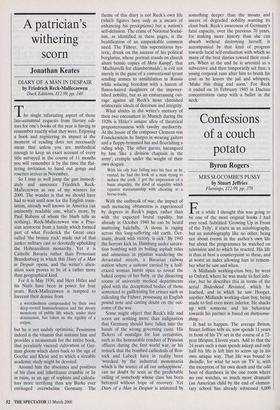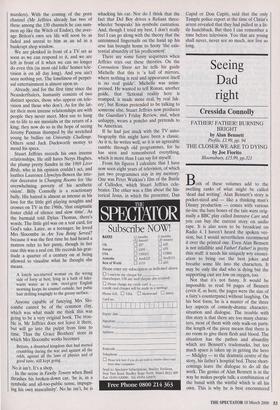Confessions of a couch potato
Byron Rogers
MRS SLOCOMBE'S PUSSY by Stuart Jeffries Flamingo, £12.99, pp. 378 or a while I thought this was going to be one of the most original books I had ever read. Subtitled 'Growing Up in Front of the Telly', it starts as an autobiography, but an autobiography like no other, being not about events in the author's own life but about the programmes he watched on television and to which he reacted. His life is thus at best a counterpoint to these, and at worst an index allowing him to remem- ber what he saw and when.
A Midlands working-class boy, he went to Oxford, where he was made to feel infe- rior, but he describes this in terms of the serial Brideshead Revisited, which he loathed, and in which he saw Hooper, another Midlands working-class boy, being made to feel even more inferior. He shacks up with someone and his behaviour towards his partner is based on thirtysome- thing.
It had to happen. The average Briton, Stuart Jeffries tells us, now spends 11 years in front of his TV set in the course of a 72- year lifespan. Eleven years. Add to that the 24 years such a man spends asleep and only half his life is left him to screw up in his own unique way. That life was bound to dwindle, for what he sees on TV is, with the exception of his own death and the odd bout of diarrhoea in the one room where no one watches, so much more dramatic (an American child by the end of elemen- tary school has already witnessed 8,000 murders). With the coming of the porn channel (Mr Jeffries already has two of these among the 150 channels he can sum- mon up like the Witch of Endor), the aver- age Briton's own sex life will soon be as faded and unreal to him as an ad in a bankrupt shop window. We are plonked in front of a TV set as soon as we can respond to it, and we are left in front of it when we can no longer do even this (in most old folks' homes tele- vision is on all day long). And you ain't seen nothing yet. The loneliness of perpet- ual entertainment is almost upon us.
Already, and for the first time since the Neanderthalers, humanity consists of two distinct species, those who appear on tele- vision and those who don't. As for the lat- ter their most intense relationships are with people they never meet. Men use to hang on to life to see messiahs or the return of a king; they now do so in the hope of seeing Jeremy Paxman thumped by the wretched young he bullies on University Challenge. Others send Jack Duckworth money to mend his specs. Stuart Jeffries records his own intense relationships. He still hates Nerys Hughes, the plump pretty Sandra in the 1969 Liver Birds, who in his opinion couldn't act, and loathes Laurence Llywelyn-Bowen the inte- rior decorator in Changing Rooms for 'the overwhelming poverty of his aesthetic vision'. Billy Connolly is a reactionary bully. His hatred is almost as intense as his love for the little girl playing noughts and crosses on TV in the 1960s, 'that enigmatic foster child of silence and slow time'. As the barmaid told Dylan Thomas, there's words. The little girl was on a test card, for God's sake. Later, as a teenager, he loved Mrs Slocombe in Are You Being Served? because it was the first time he had heard a matron refer to her pussy, though in her case this was a real cat. He records his grat- itude a quarter of a century on at being allowed to visualise what he thought she meant.
A lonely sex-starved woman on the wrong side of forty at best, lying in a bath of luke- warm water as a raw, steel-grey English morning keeps its counsel outside, her pubic hair drifting longingly to the greasy surface.
Anyone capable of fancying Mrs Slo- combe cannot be of the common clay, which was what made me think this was going to be a very original book. The trou- ble is, Mr Jeffries does not leave it there, but will go into the pulpit from time to time. Thus the Grace Brothers' store in which Mrs Slocombe works becomes
Britain, a disunited kingdom that had started crumbling during the war and against all the odds, against all the laws of physics and of good taste, still kept going ...
No it isn't. It's a shop. In the scene in Fawhy Towers when Basil thrashes his broken-down car, 'he is, in a symbolic and all-too-public sense, impugn- ing his own masculinity'. No he isn't, he is whacking his car. Nor do I think that the fact that Del Boy drives a Reliant three- wheeler 'bespeaks' his symbolic castration. And, though I tried my best, I don't really feel I can go along with the theory that the untrimmed fingernails on the hand up his arse has brought home to Sooty 'the exis- tential absurdity of his predicament'.
There are some funny sequences when Jeffries tries out these theories. On the Coronation Street set he tells his guide Michelle that this is 'a hall of mirrors, where nothing is real and appearance itself is no real guide'. Michelle was unim- pressed. He wanted to tell Ronan, another guide, that 'fictional reality here is trumped, is made more real, by real fak- ery', but Ronan pretended to be talking to someone else. Stuart Jeffries now produces the Guardian's Friday Review, and, when unhappy, wears a poncho and pretends to be American.
If he had just stuck with the TV auto- biography this might have been a classic. As it is, he writes well, so it is an agreeable ramble through old programmes, for he has seen and remembered everything, which is more than I can say for myself.
From his figures I calculate that I have now seen eight years of television, of which just two programmes stay in my memory. One was Peter Watkins's film of the Battle of Culloden, which Stuart Jeffries cele- brates. The other was a film about the his- torical Jesus, in which the presenter, Dan Cupid or Don Cupitt, said that the only Temple police report at the time of Christ's arrest revealed that they had pulled in a lit- tle hunchback. But then I can remember a time before television. You that are young shall never, never see so much, nor live so long.



















































































 Previous page
Previous page